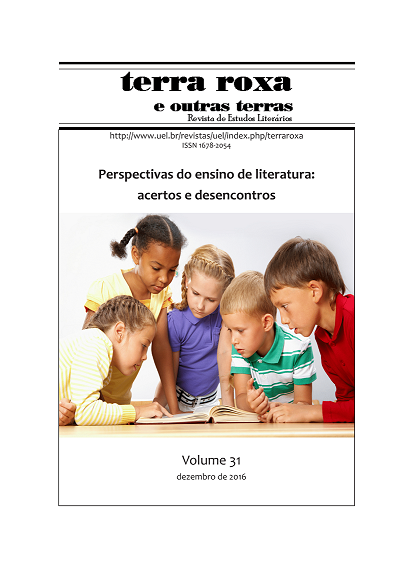Reading instruction and knowledge appropriation by didatic of subjective reading in nul poissom où aller (2006), by Marie-Francine Hébert
DOI:
https://doi.org/10.5433/1678-2054.2016v31p44Keywords:
Didatic of subjective reading, Reading instruction, Children literature. DiaryAbstract
This article presents the didactic of the subjective reading from the teaching work about the children's book Nul poissom où aller, by Marie- Francine Hébert, 2006, that integrates the collection of National Library Program at School (PNBE). We depart from the didactic of the subjective reading, implemented in France in early XXI century, and the proposed work plan with Nul poissom où aller, by Marie - Francine Hébert, 2006, emphasizing the grasp of literary knowledges by the daily reading writing in the classroom. We start with the theme "social conflict", in order to aim possibilities in teaching to read literature in the classroom, for classes of 6Th grade at elementary school II, through the elements that reveals the reader's subjectivity and its esthetics competence (Rouxel 2014: 28). The work is justified by the subjective reading being inserted in the constructive way in the act of reading, as a contextual, socialcultural and identity issue of the reader in training. (Jouve 2013; Petit 2008).Downloads
References
ECO, Umberto. Seis passeios pelos bosques da ficção. Companhia das Letras, 1994.
GIDE, André. Diário dos moedeiros falsos. Trad. Mario Laranjeira. São Paulo: Estação Liberdade, 2009.
HÉBERT, Marie-Francine. Nenhum peixe aonde ir. Ilustrações de Janice Nadeau. Trad. Maria Luiza X. da A. Borges. São Paulo: SM, 2006.
JAUSS, Hans Robert. História da literatura como provocação à ciência literária. São Paulo: Ática, 1994.
JOUVE, Vincent. A leitura. Trad. Brigitte Hervor. São Paulo: Editora da UNESP, 2002.
JOUVE, Vincent. "A leitura como retorno a si: sobre o interesse pedagógico das leituras subjetivas". Trad. Neide Luzia de Rezende. Annie Rouxel, Gérard Langlade e Neide Luiza de Resende, (orgs.). Leitura subjetiva e ensino de literatura. São Paulo: Alameda, 2013. p. 53-65.
LANGLANDE, Gérard. "O sujeito leitor, autor da singularidade da obra". Annie Rouxel, Gérard Langlade e Neide Luiza de Resende, (orgs.). Leitura subjetiva e ensino de literatura. São Paulo: Alameda, 2013. p. 25-38.
PARANÁ. Secretaria de Educação do Estado do Paraná. Diretrizes Curriculares para Língua Portuguesa e Literatura. Curitiba, 2008.
PETIT, Michèle. Os jovens e a leitura: uma nova perspectiva. Trad. Celina Olga de Souza. São Paulo: 34, 2008.
RAMOS, Ana Margarida. "Paz e guerra - os conflitos bélicos na literatura portuguesa para a infância". Livros de palmo e meio: reflexões sobre literatura e infância. Lisboa: Caminho, 2007. p. 98-131.
REZENDE, Neide Luzia de. "A formação do leitor na escola pública brasileira: um jargão ou um ideal?". José Helder Pinheiro Alves, (org). Memórias da Borborema 4. Campina Grande: Abralic, 2014. p. 37-54.
ROUXEL, Annie. "Autobiografia de leitor e identidade literária". Annie Rouxel, Gérard Langlade e Neide Luiza de Resende, (orgs.). Leitura subjetiva e ensino de literatura. São Paulo: Alameda, 2013. p. 67-87.
ROUXEL, Annie. "Ensino da Literatura: experiência estética e formação do leitor". José Helder Pinheiro Alves, (org). Memórias da Borborema 4. Campina Grande: Abralic, 2014. p. 19-35.
ROUXEL, Annie. "Mutações epistemiológicas e o ensino da literatura: o advento do sujeito leitor". Trad. Samira Murad. Revista Criação e Crítica (São Paulo), v. 9, p. 13-24, 2012. Disponível em: http://www.revistas.usp.br/criacaoecritica/article/view/46858/50609/. Acesso em: 01 de ago de 2015.
TODOROV, Tzevetan. A literatura em perigo. Trad. Caio Meira. Rio de Janeiro: DIFEL, 2009.
Downloads
Published
How to Cite
Issue
Section
License
Copyright (c) 2016 Terra Roxa e Outras Terras: Revista de Estudos Literários

This work is licensed under a Creative Commons Attribution 4.0 International License.
Authors who publish in this journal agree to the following terms:
a) The authors retain the copyright and grant the journal the right of first publication, the work being simultaneously licensed under the Creative Commons Attribution-NonCommercial 4.0 International License, allowing the sharing of the work with acknowledgment of the authorship of the work and initial publication in this journal.
b) Authors are authorized to assume additional contracts separately, for non-exclusive distribution of the version of the work published in this journal (eg, publish in an institutional repository or as a book chapter), with acknowledgment of authorship and initial publication in this journal.
c) Authors are allowed and encouraged to publish and distribute their work online (e.g. in institutional repositories or on their personal page) after the editorial process, as this can generate productive changes as well as increase impact and citation of the published work (See The Effect of Open Access).
d) The authors of the approved works authorize the journal to, after publication, transfer their content for reproduction in content indexers, virtual libraries and the like.
e) The authors assume that the texts submitted for publication are of their original creation, taking full responsibility for their content in case of any objection by third parties.




















